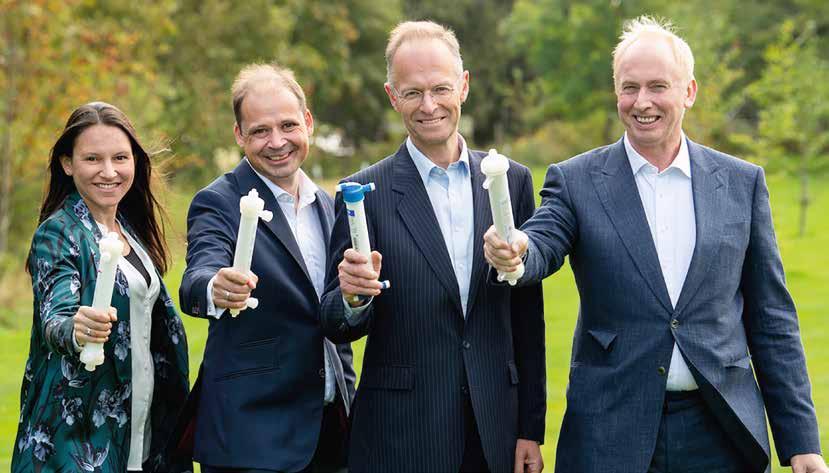
5 minute read
ABHI leads Chief Innovation Officer call
In 2017, ABHI, working with the Nuffield Trust, set out to investigate why the NHS struggles to make the most of new innovations.
Of the findings, one of the biggest barriers to adopting innovation is that too often it is not embedded in routine processes and operational management decisions. It is frequently seen as a luxury, only to be attempted when everything else is going well rather than as a core part of improving quality and efficiency.
NHS Trust Boards see regular metrics on finance and performance, quality and safety, and workforce, with Executive Directors responsible for these important areas. As part of their “Well Led” inspection framework, NHS organisations are required to have robust systems and processes in place for learning, continuous improvement and innovation. But, with few exceptions, nobody at a Board level holds this portfolio. Until this is actively built into a senior job description, it is unlikely to become business as usual.
This is why ABHI is calling on every NHS organisation to appoint a dedicated Chief Innovation Officer whose role will enable hospitals to deliver efficiencies whilst adopting life changing HealthTech.
As part of each hospital Board, Chief Innovation Officers can make a fundamental difference to the NHS, whilst ensuring maximum value to the taxpayer.
To find out more, contact eleanor.charsley@abhi.org.uk
www.abhi.org.uk
We innovate healthcare
At Roche our aim is to improve the health, quality of life and well-being of people around the world by providing an innovative range of diagnostic solutions and medicines. Roche is a global, research-focused healthcare company with Group Headquarters in Basel, Switzerland.
Our strategy is clear - the patient lies at the heart of everything we do and our focus is fitting the treatment to the patient through prescription pharmaceuticals and in-vitro diagnostics.
What makes Roche distinctive is our pursuit of excellence in science as we deliver the best solutions for healthcare professionals and improve patient outcomes; this is achieved through our unique combination of Pharmaceuticals and Diagnostics.
Everyday, our products help patients and the healthcare professionals who care for them by detecting, preventing, diagnosing, treating and monitoring diseases.
We are proud to have played a pioneering role in UK healthcare since 1908. Today, we are the leading in-vitro diagnostics company in the UK and the leading provider of pharmaceutical treatments for cancer and viral diseases. We are also a major supplier of medicines for the treatment of transplantation, virology, bone and rheumatology and renal anaemia. In total, our UK pharmaceutical and diagnostics businesses employ nearly 2,000 people.
Personalised Healthcare
We combine our strengths in pharmaceuticals and diagnostics to better fit treatments to patients. When genetic differences can be identified, the efficacy and safety of medicines can be improved enormously. To this end we have a companion diagnostic strategy for every molecule we develop.
Diagnostics
As the UK leader in diagnostics solutions, we offer a uniquely broad and innovative portfolio of products to patients, physicians, researchers, hospitals, laboratories and universities. Our UK Diagnostics business, headquartered in Burgess Hill, West Sussex, employs approximately 500 highly skilled individuals. Diagnostics is set to play an increasingly important role in the future of healthcare as genetic knowledge presents new and exciting opportunities. Our desire is to provide clinicians and patients with Actionable Health Information - information that reduces the uncertainty in the medical decision making process, enabling them to choose between available alternatives to prevent or treat disease.
Contributed by Andrew Davies, Digital Health Lead, ABHI ABHI: The data debate
In my role as Digital Health Lead for ABHI, I have been looking into the area of trust, ethics and data. Personally, I do not see significant progress being made in the debate. Around the many and varied tables where I have been discussing this, there is a good sense of unanimity about what needs to happen to ensure the continued trust and engagement of patients and citizens. Namely, that we need a robust public dialogue on the subject. That is why we at ABHI have called for funding towards a public communications programme, informing citizens of the benefits to themselves and others of sharing health data.
The Research The Open Data Institute (ODI), working with YouGov, has tested public attitudes on data ethics, with the NHS outperforming the rest of Government and the wider public sector. 59 per cent of people say they trust the NHS to be ethical in its use of their data. However, this shows a decline since a similar survey in early 2018, which recorded a score of 64 per cent. Is the decline a blip or a trend?
Other research has found that patients have not yet fully bought into the use of technology. The first Digital Dispatch referenced a report from the RSA, entitled Patient AI, which found some resistance to the introduction of digital technologies, as patients believed that their introduction was part of a “political agenda” rather than for improved patient care.
Furthermore, there continues to be incidents of unconsented data sharing, or at the very least, a lack of transparency in how consent data is used. Recent articles highlight this, and when it comes to data, the UK is not an island. Health data misuse, even in other jurisdictions, could easily cause concern and slowly erode trust, leading to a reticence to share data.
The Conversation It is against this backdrop that I hear a shift in the conversation around data. At the start of the year, most people were talking about data ownership. Whose data is it? Patient? NHS? Device/diagnostic manufacturer? Big tech company? Many thought such questions were both too difficult to answer and unhelpful. The real issue was consent. This progressed to a discussion on “assumed consent” on the basis that the NHS and the public have a Social Contract, which seems reasonable… theoretically… although research conducted around genomics showed a lack of unfamiliarity with the terminology around ‘Social Contract’. Hardly surprising given this terminology is largely confined to ‘those in the know’ and nothing is written or explicit. Building on the idea of assumed consent, the discussion has shifted again to focus on governance and how the public can be included in the processes to ensure propriety and transparency since their consent is there. I believe there is risk for industry in the idea of assumed consent if patients subsequently learn their information, in anonymised form, has been used by a company without their knowledge. While also there are obvious benefits in the possible datasets that could be constructed. The Outcome This should be a situation where everyone wins. According to Ernst & Young, the NHS could get nearly £10bn a year through savings, improved outcomes and economic benefits. Industry gain access to a potentially unrivalled dataset to develop new technologies and processes. Patients and citizens reap the benefits of both, seeing enhanced population health, better and earlier diagnosis and improved treatment outcomes, all from new, more accessible care settings.
But we need the dialogue to happen, we need a public ethical framework and we need trust in the system. Let’s see how the conversation develops...








